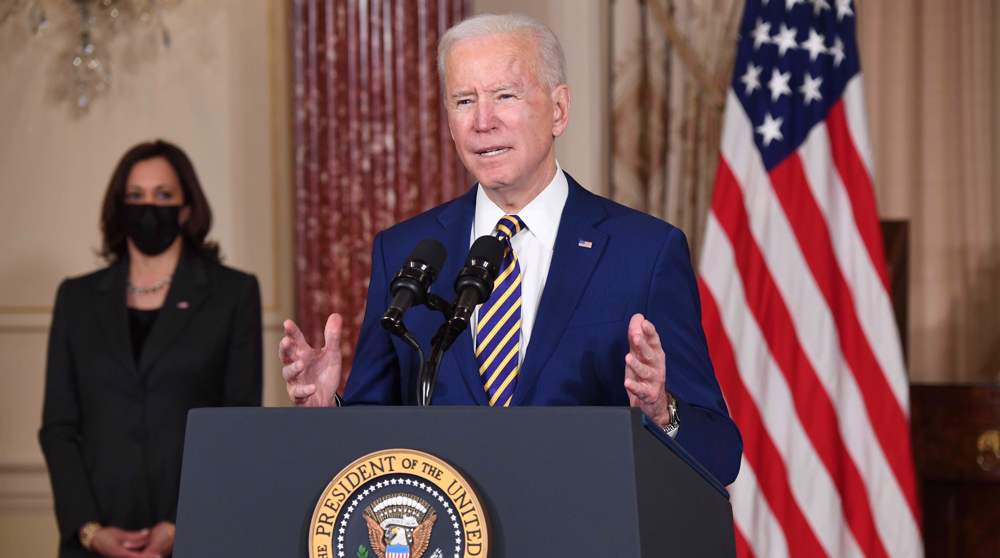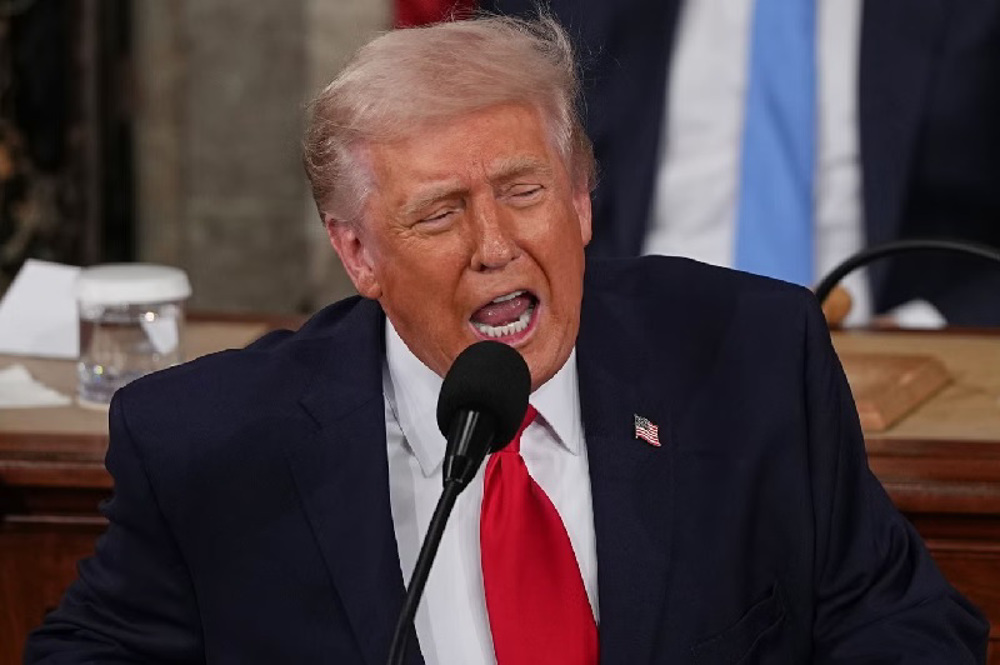Will Joe Biden continue economic war with China?
The impact of the COVID-19 virus has played its part on the world’s economy, yet, it seems that the recovery time from the depression caused is something that could be a factor in just how individual economies pick up again, with China bouncing back from the financial impact seen in 2020.
But it’s not just the COVID-19 pandemic that has seen economies rise and fall, as from back in 2010, the Chinese economy began to exponentially gain on the US economy, as we can see in this chart from the CEBR World Economic League Table, which also shows that by the year 2028, the Chinese economy will catch up with and surpass that of the United States.
Naturally, China excels when it comes to foreign exports, and is hence a major factor in why it is able to recover so well, yet, as things settle down in China, it is the domestic market that also see’s China take an advantage over the US, data shows retail sales in China are rising faster than those of the United States, which is still seeing lockdowns and closures prevent its economy recovering as fast as that of China.
Sino-American economic front
The race is on for the world's largest economy as across the globe nations emerge slowly but surely from the devastating effects of the COVID-19 pandemic, which rocked economies and cost lives around the world.
The two largest global economies, the United States of America and China, remain with horns locked, as they have since long before the arrival of the virus. But now it seems, as the world sets out its agenda to recover, just how fast each nation can get back on its feet is something that will no doubt determine just how quickly China catch up with, and eventually surpass, the US as the world's largest economy.
Before the pandemic there was clear evidence that China was going to surpass the US in terms of its size of GDP, and on some measures or GDP measured as purchasing power parity, China had already done that in 2019. So, the pandemic itself wasn't the reason for this; this was already happening.
Kent Mathews, Professor of Banking and Finance, Cardiff University
Whereas China has demonstrated it has been able to successfully return into the black following the pandemic with factories and shops opening up again and lockdown measures all but eradicated.
The opposite is true in the United States, which is still seeing its economy struggle to return to pre pandemic levels, something that will no doubt hinder the rate at which they finally do recover.
Furthermore, the US under the leadership of ex President Donald Trump made it a daily routine to put America First, making sure that its internal economy was the priority, almost ignoring the notion of multilateral trade, something that China has done with great interest with examples being the global Belt and Road initiative, and the signing of the regional RCP agreement, which saw China boost its regional economic sway.
Multilateral trade systems is[sic] the answer to promoting world GDP, and also in forestalling any kind of military or economic friction. So, yes, I think, trade is the solution to many of the world's problems, the more interdependent we become the less likely we are to want to start fighting each other.
Kent Mathews, Professor of Banking and Finance, Cardiff University
With predictions suggesting that the US and China will meet economic parity in 2028, the world, and in particular the US, will be keeping a keen eye on other emerging economic powers, such as India and Russia as they edge their way up the table, potentially one day, pushing the US further down the economic leaderboard.
That's why China excels when it comes to foreign exports and this is a major factor in why it is able to recover, so well. Yes, as things settle down in China. It is the domestic market that gives China an advantage over the US.
Data shows retail sales in China rising faster than in the USA, which is still seeing lockdowns and closures preventing its economy recovering as fast as that of China.
The US and China are jostling for the top spot as the world's largest economy. Are we set to see a change in the status quo, or is the global financial complex on a radically different route, inspired by recent global events?
I think that China's economic growth is unstoppable. Barring any major disruptions in international relations, I think China is on a path to the number one economy in the world.
But that being said, we should not under estimate the US resilience, giving the historical examples and US has gone through some worse, major disruption, but somehow it recovered.
So I think that China is going to be the number one, but it may take a little bit time for China to achieve that spot.
Ming Du, Professor of Chinese Law and Trade at Durham University
One of the main reasons that China seems to be catching up with the Americans, in terms of their GDP growth rate, is the fact that the Chinese seem to have emerged from the Covid-19 pandemic more efficiently and speedily than the US, and this is reflected in their economy. Could US mismanagement be the main reason for the exponential growth rates?
I think the key word here is resilience. The Chinese economy, and more broadly, the Chinese state and its society, are just far more robust and resilient than their Western counterparts. I mean let's face it, the West just fell apart in the face of this pandemic. Look at the UK, for instance, it has the highest death rate per capita in the world, the US is in disarray in terms of COVID-19, but China, where the virus supposedly originated, has dealt (with it) incredibly well. It suppressed it very early on, because it's a much more cohesive country, state and society work very well together.
Mahan Abedin, Current Affairs and Impact Analyst
China was the first country hit by COVID-19 but managed to control the disease without the need to repeat economically paralysing lockdowns as European countries have been forced to do.
That speaks to preparedness, both on the part of the state, and also on the part of society, to accept very harsh measures, very early on, to get on top of a problem. The problem in the West, specifically, Western Europe and North America, is that the society and the state were not in sync.
Mahan Abedin, Current Affairs and Impact Analyst
Military spending may be having a negative effect on the American economy yet China seems to have avoided this problem, much to its advantage.
It can be argued that one of the main reasons that China is catching up with the US is based on two very important factors. The first is the most obvious, namely the way in which a country makes its money, which for China predominantly comes in the form of large manufacturing output, one that essentially sees China being labeled as the factory of the world.
But the second factor, one that may be overlooked by many, is how each nation spends its money. And this is where the real difference comes into play when it comes to comparing the US and China.
Although the US enjoys a huge income from its well established military industrial complex, the US also spends more than any other nation on military hardware, In fact, seeing the US spend over $732 billion in 2020; 3 times that of China at 261 billion.
China, although the world's second largest military spending nation, has used much of its income for investment in non military fields, especially the technology industry, proving that its research and development in the area has boosted its GDP by leaps and bounds, and it's something that the US have attempted to curb by implementing sanctions against various Chinese tech companies, none more famous than leading Chinese telecommunications company Huawei.
Furthermore, the One Belt, One Road initiative has seen China invest in infrastructure logistics and technology across the world. In fact, touching over 140 countries, hence seeing China divert its funding away from the military complex and into investment and long term strategies, something that has potentially boosted the Chinese economy more than any other single factor.
I think the Belt and Road initiative is more an extension of its economic power in much the same way as the private sector expanded in the British Empire in the 19th century. This expansion of economic power is projected through the Belt and Road initiative. What's needed in China to sustain its position as the largest economy and the most powerful economy is productivity in China, trade will go some way towards that as the Belt and Road initiative is meant to support. But, that in itself is not sufficient.
Kent Mathews, Professor of Banking and Finance, Cardiff University
With the US clearly aware of the fact that China is fast catching up with it, various stalling methods have been placed against China, including the sanctions that we've just mentioned, but more worryingly seeing the US stoke the flames of tension in places like Hong Kong and Taiwan, something that could cause a Cold War to rapidly warm up.
It could really depend very much on the miscalculation on either side, because for China, domestic consumption of its policy is extremely important, and therefore, if it looks as if they're being threatened by an outside force, the real worry for China is not so much the outside force but what happens inside. And therefore, that would force them into acting militarily.
Kent Mathews, Professor of Banking and Finance, Cardiff University
The US spends trillions of dollars on its military whereas China has concentrated on technological advances boosting its economy in the process.
Is the tech industry in China undermining the USA?
It is true that China is spending millions and billions of dollars on technology industry, whether it will overtake (the) US or undermine (the) US in this respect, I believe it's unclear. While the background of China's focus on technology is of course China's Achilles heel. For example, China produces its own semiconductor chips; the US sanction against the Huwaei that prohibited supply of chips has put a lot of pressure on China's national champion, so, well, it is indeed a wakeup call for Chinese government to concentrate its resources on developing some core and key technology. And well, we are trying to succeed. I believe so given time. Yes, but it takes time for China to sort out its technology problems, and overtake the US in that regard.
Ming Du, Professor of Chinese Law and Trade at Durham University
The US has taken great steps to curb the progress that's been made by the Chinese, and one of those steps was the way they dealt with Huawei in terms of the way it restricted it. The restrictions were multifaceted; they barred companies from doing business with Huawei citing national security concerns, proscribed supplying equipment for network infrastructure to supply chains, to name a few etc.
Had the US made a concerted effort, without holding back, to stop China, advanced technologically?
Oh, absolutely. I mean under the previous administration they did everything they could and Huawei, I think, is actually the best example. They did two things in relation to Huawei; they actually put pressure on Canada to detain one of the executives of Huawei, and she's still under house detention as far as I know, and more importantly, they applied so much pressure on the UK to cease all cooperation with Huawei because Huawei was tasked with developing the UK’s 5G network. And initially the UK agreed to the deal and then they reneged on it saying that, you know, it can only have a peripheral role to play and then the Brits even went further, as a result of American pressure, and said we will terminate all cooperation with Huawei before the end of the decade.
Mahan Abedin, Current Affairs and Impact Analyst
As stated, the COVID-19 pandemic has taken its toll on both the Chinese and the US economies, but as we emerge from the pandemic, a report by the Centre for Economics and Business Research suggests that the US economy is expected to grow by around 1.9% annually between 2022 and 2024, slowing to 1.6% after that, whereas the Chinese economy is expected to grow by 5.7% annually until 2025, before settling in at 4.5% thereon.
As things stand, the US and China are the top two largest economies in the world, with the US enjoying a nominal GDP of $21.44 trillion, compared to China’s $14.4 trillion, however, when we look at the GDP per capita, due to China’s large population, it would only require a GDP per head half the size of that of the US to see China’s overall economy become twice the size of that of the US.
It seems that it is not just China that is threatening the US position as the world’s largest economy. According to the Standard Chartered Bank, once the US falls behind China it will likely never be able to reclaim its position and may even fall behind the rising economy of India. By 2030, 35% of the global GDP will be created in Asia, with 6 of the world’s top ten economies located in that region.
But it seems the key to success for China is in its Belt and Road Initiative which, unlike the US, has seen China avoid spending money on its military, instead investing in the global economy, with figures of between $50 to $100 billion dollars a year being distributed into thousands of projects across Asia, Africa, Europe and South America, yielding high returns in the process.
Sino-US relations may look different with a new US President at the helm, one that appears to have already started reversing multiple decisions made by his predecessor, Donald Trump.
Let the Biden era begin
Many people, when asked whether Joe Biden will do a better job than Donald Trump when it comes to Sino-American relations, will likely answer to the effect that, well, he couldn't do any worse yet, is this really the case?
The 46th President of the United States has already shown so much promise in reversing many of the policies set by his predecessor, as demonstrated by the pile of executive orders he signed on his first day in office.
However, so far, none of the actions taken by Biden in his first days and weeks in office has pointed to any sign of change in US relations with China, with Biden very much aware that the COVID-19 pandemic has slapped the US economy harder than ever, as well as the notion that the nation he now presides over is more divided than ever.
Is the gentleman persona that Biden wishes to portray a false flag character, and does the mom and pop look hide the true Biden, who may well turn out to be nothing more than a wolf in sheep's clothing?
A wolf in sheep's clothing sounds like a good way of describing it, I don't think policy towards China is going to change radically. I think what's going to be different is the way it's going to be projected on the world press, and that's quite important for China because face saving policy is extremely important in their thinking. So, it will be a return to the sort of Roosevelt type policy, that is, Theodore Roosevelt policy, that is to speak softly and carry a large stick. So, the kind of policy that will be going will be one that will be less confrontational, but it certainly will be challenging China.
Kent Mathews, Professor of Banking and Finance, Cardiff University
For Joe Biden, the US-China relationship is not something that can just be brushed under the carpet, with the world clearly having to take multiple issues more seriously than ever, be it the environment, security, trade and of course, global health, the US has indicated that both patience and consultation with allies is key, as to how the relationship may play out over the next four years.
We're starting from a, an approach of patience as it relates to our relationship with China. So that means we're going to have consultations with our allies, we're going to have consultations with Democrats and Republicans and we're going to allow the inter-agency process to work its way through to review and assess how we should move forward with our relationship.
Jen Psaki, White House Spokesperson
What now remains to be seen, is just how patient the US can be. There's no doubt that China is fast on the way to replacing the US as the world's largest economy, and should other Asian nations follow suit, It could be more of a problem than expected for the US.
However, if there's one thing that Joe Biden will want to leave as an early legacy of his presidency, it's a notion of undoing the mistakes of Trump, be this at home in reuniting his polarized country or across the international arena where Trump haphazardly lost the United States so many admirers and friends.
Joe Biden has taken the helm in the US and has reversed many of Donald Trump's policies. Is it likely that he will work towards reversing the US China decoupling policy that was set by Donald Trump hence easing the ongoing trade war in the process?
Well, no, I think Biden has lots of differences, with Donald Trump but towards China policy, I think Biden has a very similar deal against China. Well, that being said, the battle is going to continue the competitive pressure on China. Biden may adopt a different strategy. For example, Trump may prefer the unilateral stance against China but Biden will make alliances with other countries with Europeans, with Japan, with its other allies against China to organise the United Front against China. I think that competition and rivalry between China and the US will continue with a Biden, administration.
Ming Du, Professor of Chinese Law and Trade at Durham University
As we enter a new multi-polar world order, the way in which nations act and react with each other, takes the stage on a host of levels. Whereas traditional competition may have come in the form of military might, today the world sees a combination of many factors, ranging from military, economic and regional competition, which all play their part in the global arena.
For China and the United States, the ‘Cold War’ is being fought at an economic level, with a host of tactics being thrown into the ring, including blocking Chinese technology under the shady cloak of national security, to the proxy Cold War’s being fought in Hong Kong and Taiwan, both of which have seen heavy US influence in their ongoing sagas.
What now remains to be seen is how the situation will play out as China goes from strength to strength, and the US opens a new chapter in its policy towards China with a new man in the White House.
Iran slams US-Israeli attack on Tehran's 12,000-seat Azadi sports complex as war crime
Death toll from US-Israeli aggression against Iran crosses 1,200
Iran won't stop its retaliation until the aggressor is punished: Speaker Ghalibaf
Iranian armed forces deny launching drone strike toward Azerbaijan
IRGC strikes critical Israeli military sites with Khorramshahr-4 missiles in latest wave
US F-15E Strike Eagle multi-role attack fighter jet downed by IRGC air defenses
Iran won't target its neighbors, but US bases across region: FM spox
‘Unacceptable cowardice’: Indians slam Modi govt’s silence over US attack on Iranian ship




















 This makes it easy to access the Press TV website
This makes it easy to access the Press TV website